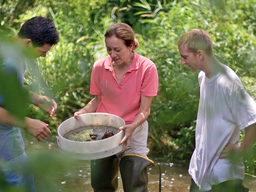Designing Embodied Learning Experiences √ §
Part of our Advanced Topics Series!
Location
Online
Date & Time
September 13, 2021, 12:00 pm – 1:00 pm
Description
After a year of sitting idle and isolated inside our WebEx windows, hyperfocused on physical health, how can we re-invigorate our return to the classroom with kinesthetic learning approaches? How do movement and embodied experiences interact with cognitive and affective learning? Embodied cognition research demonstrates how physical experiences shape our thinking, how our bodies interact in social spaces like the classroom, and how our bodies reward us for synthesizing new experiences (Hrach 2021). Join us to complicate your cognitive and affective taxonomy knowledge by integrating ideas from the psychomotor taxonomy and embodied learning research, to generate practical applications adaptable to classrooms of many sizes and modes.
Please click “Going Virtually” below to reserve your seat for this
session, and we will send you a Google calendar invitation with a WebEx
link one hour before the session. If you register less than an hour
before the session, you will receive the WebEx link when you register.
Please email fdc@umbc.edu
if you have any questions. If you have registered and find that you can
no longer attend, please kindly release your spot so that others may
attend.
§ Counts toward the INNOVATE Certificate
The Advanced Topics Series
Launched in September 2021!
Sessions in this series are designed to delve deeper into special topics that synthesize multiple research-based ideas for cultivating student learning. During these sessions, faculty and staff colleagues will support your efforts to energize your classroom with classic and cutting-edge pedagogical approaches that will help you to...
Launched in September 2021!
Sessions in this series are designed to delve deeper into special topics that synthesize multiple research-based ideas for cultivating student learning. During these sessions, faculty and staff colleagues will support your efforts to energize your classroom with classic and cutting-edge pedagogical approaches that will help you to...
- Identify how to integrate complex learning science applications into your course design and delivery,
- Challenge your higher order thinking skills to investigate and assess new ways to foster student success, and
- Connect and collaborate with colleagues seeking to create exemplary learning exercises and environments across courses and learning opportunities.
- aspire to complicate and build on core pedagogical knowledge shared in other FDC programs, or
- wish to cultivate and apply learning research to innovative, engaging, and effective classroom practices.
